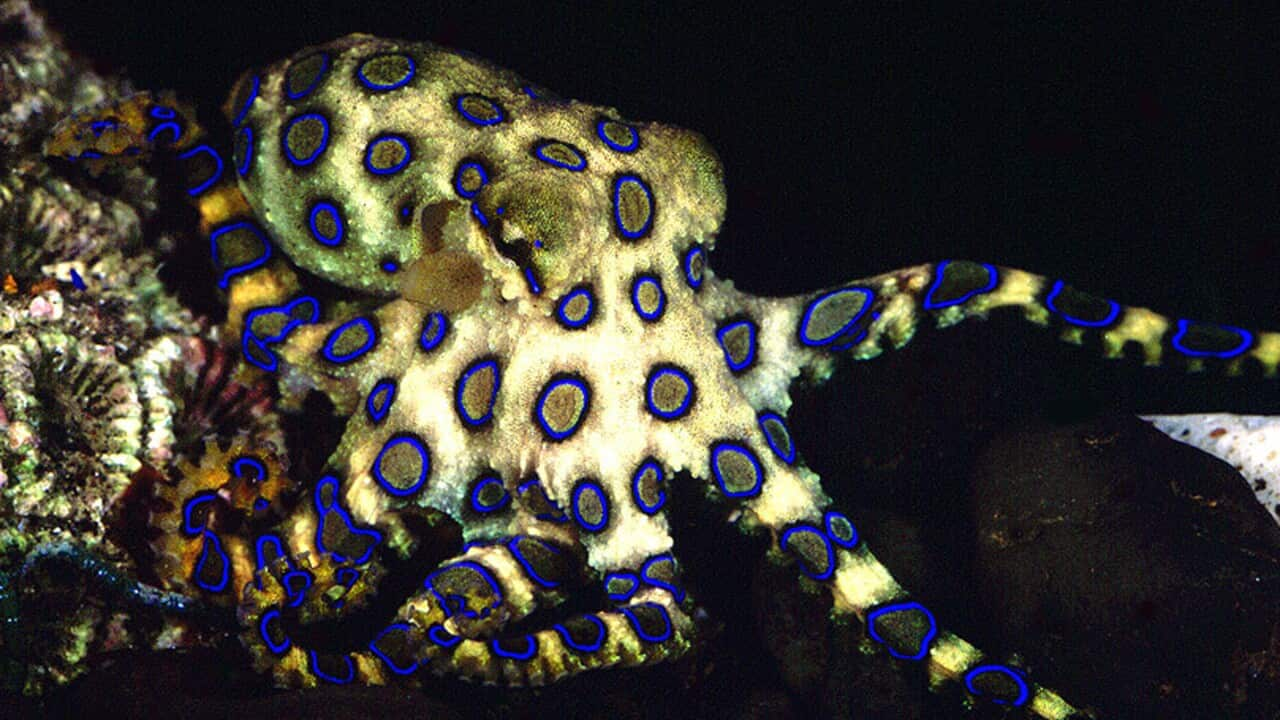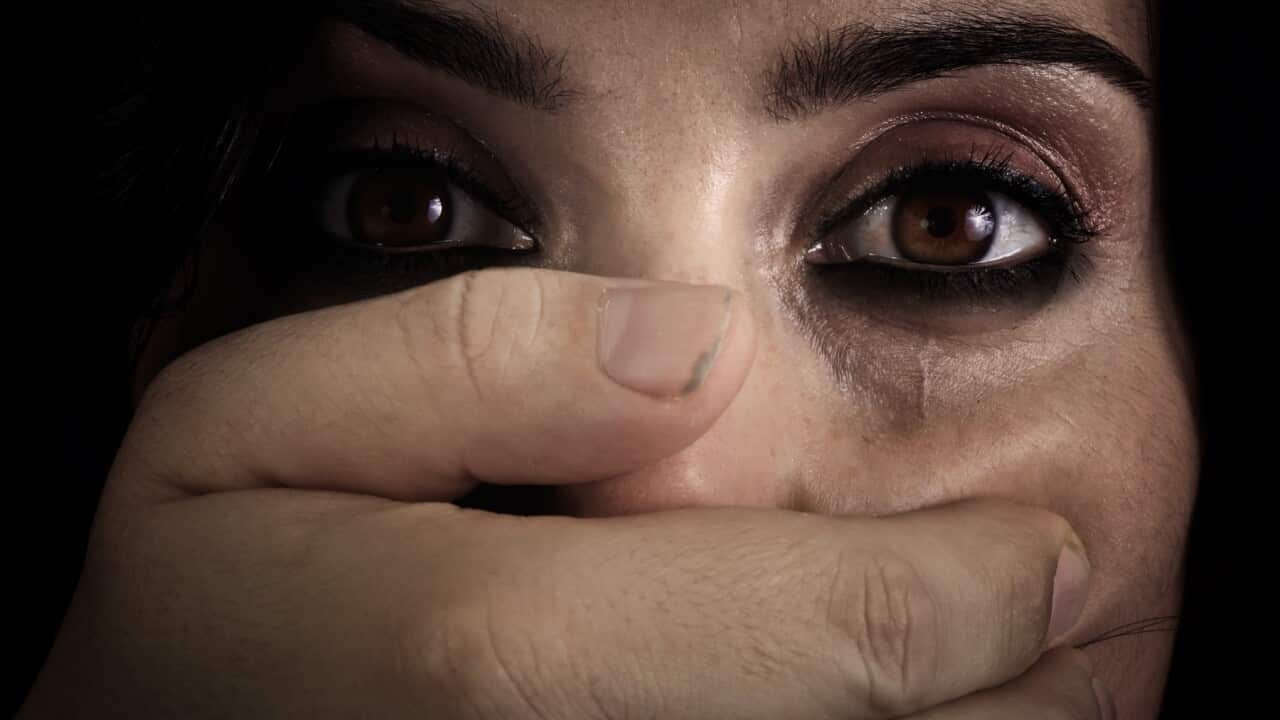English
Strong acting, and so powerful it can quickly cause death.
That's the reality for those unlucky enough to be bitten by a blue-ringed octopus.
Initially its bite is painless.
But quickly the fast-acting toxin goes to work, paralysing its target.
Doctor Amanda Reid is a taxonomist and former employee of the Australian Museum in Sydney.
She says while many octopuses release a toxin, blue ringed octopus is a stand out.
"They're not different to any other octopuses. Where they do differ is that they've got a very powerful poison called tetrodotoxin poison which means that they've got a very fatal bite. They can inject poison into their prey. This actually is not unique to blue-ringed octopuses, there are some other species that are poisonous as well. But it's not known whether those other species are harmful to humans."
The blue-ringed octopus group is known for its iridescent markings that dot their bodies.
They usually leave humans alone unless they are provoked in some way.
New South Wales ambulance inspector Christian Holmes confirmed a woman had been bitten by the octopus at Chinamans Beach in Mosman, Sydney, on Thursday March 16.
He said the woman had picked up a shell containing the octopus.
It fell out and bite her stomach.
The woman managed to put the octopus in a jar, making it easier for paramedics to identify what it was.
Mr Holmes says there is no anti-venom for this octopus bite and if treatment is not quickly administered, death is extremely likely.
"It's very rare to see a blue ring octopus bite. It's actually the first time I've seen one and so have my colleagues, none of us had seen it before. So we were madly checking to make sure we covered every base on it. We actually spoke to the Poisons helpline, which we recommend everyone speak to when you have bites you can't identify. It is manned 24 hours a day. And they can give you advice for first aid for bites, and stings of any animals."
Mr Holmes says the bite is treated in a similar way to a snake bite.
If it's on a limb, paramedics recommend doing a compression bandage.
That involves wrapping a whole limb up with a very firm bandage until the patient can get further medical treatment.
"It is quite a fast acting venom when they do bite you. We were on scene within about 15 minutes of the bite. And we starting to see the beginnings of the symptoms, the tingling and numbness in the mouth. It will progress to shortness of breath and eventually paralysis. And unfortunately, when it goes that way, there's not much we can do. We just have to monitor treat the symptoms as we see them, undertake CPR and breathing assistance for the patients."
Blue-ring octopuses are tropical and temperate creatures.
They are native to Australia and also found throughout the Indo-West Pacific.
Dr Reid says they are very common, but also very introverted.
"They hide in rock crevices, and in empty shells, and other places that they can find to secrete themselves away. They feed on fish and crustaceans. And they're quite secretive. Sometimes divers might pick up a shell to get down their wetsuit and it might just happen to have a blue-ringed octopus inside it, and people can get bitten that way. Also, because they flash blue rings, when they're alarmed, there is a possibility that people might think oh, wow, and pick one up."
The good news Mr Holmes says is that if people get help quickly enough, they can hope for a good recovery.
"The bite itself is quite often painless. So you don't really realise you've been bitten until you see the little guy on you. And they are little most of them are only about the size of a 50 cent piece. And they do look very cute. And kids especially do like to pick them up. And that's when they start to get angry and they'll start showing their blue rings. And that's when you got to be really careful with them. So the advice is never pick up an octopus, especially little ones that look cute."
Italian
Un forte effetto, e così potente che può rapidamente causare la morte.
È questa la realtà per coloro che hanno avuto la sfortuna di venir morsi da un polpo dagli anelli blu.
Inizialmente il suo morso è indolore.
Ma la tossina ad azione rapida entra velocemente in funzione, paralizzando il suo obiettivo.
La dottoressa Amanda Reid è una tassonomista ed ex-dipendente dell’Australian Museum di Sydney.
Ha detto che, sebbene molti altri polpi rilascino una tossina, quella del polpo dagli anelli blu si contraddistingue.
"They're not different to any other octopuses. Where they do differ is that they've got a very powerful poison called tetrodotoxin poison which means that they've got a very fatal bite. They can inject poison into their prey. This actually is not unique to blue-ringed octopuses, there are some other species that are poisonous as well. But it's not known whether those other species are harmful to humans."
Il gruppo dei polpi dagli anelli blu è conosciuto per le macchie cangianti che punteggiano il suo corpo.
Sono soliti lasciare in pace l’uomo, a meno che non venga provocato in qualche modo.
Christian Holmes, ispettore delle ambulanze in New South Wales, ha confermato che una donna è stata morsa da uno di questi polpi presso la Chinamans Beach di Mosman, a Sydney, giovedì 16 marzo.
Holmes ha detto che la donna aveva raccolto una conchiglia che conteneva il polpo.
Quest’ultimo è caduto e l’ha morsa sull’addome.
La donna ce l’ha fatta a mettere il polpo in un contenitore, facilitando il lavoro di identificazione da parte dei paramedici.
Holmes ha detto che non esiste antidoto per il morso di questo polpo, ed ha aggiunto che se la terapia non viene somministrata rapidamente, la morte è molto probabile.
"It's very rare to see a blue ring octopus bite. It's actually the first time I've seen one and so have my colleagues, none of us had seen it before. So we were madly checking to make sure we covered every base on it. We actually spoke to the Poisons helpline, which we recommend everyone speak to when you have bites you can't identify. It is manned 24 hours a day. And they can give you advice for first aid for bites, and stings of any animals."
Holmes ha detto che il morso viene trattato in un modo simile a quello del morso di un serpente.
Se il morso è su un arto, i paramedici consigliano di effettuare un bendaggio compressivo.
Questo significa avvolgere tutto l’arto con un bendaggio molto rigido fino al momento in cui il paziente potrà ricevere un ulteriore trattamento medico.
"It is quite a fast acting venom when they do bite you. We were on scene within about 15 minutes of the bite. And we starting to see the beginnings of the symptoms, the tingling and numbness in the mouth. It will progress to shortness of breath and eventually paralysis. And unfortunately, when it goes that way, there's not much we can do. We just have to monitor treat the symptoms as we see them, undertake CPR and breathing assistance for the patients."
I polpi dagli anelli blu sono creature che vivono in climi tropicali e temperati.
Sono nativi dell’Australia e sono stati avvistati anche lungo le coste del Pacifico Indo-occidentale.
La dottoressa Reid ha detto che sono molto diffusi, ma anche molto timidi.
"They hide in rock crevices, and in empty shells, and other places that they can find to secrete themselves away. They feed on fish and crustaceans. And they're quite secretive. Sometimes divers might pick up a shell to get down their wetsuit and it might just happen to have a blue-ringed octopus inside it, and people can get bitten that way. Also, because they flash blue rings, when they're alarmed, there is a possibility that people might think oh, wow, and pick one up."
La buona notizia, secondo il dottor Holmes, è che se si riesce a ricevere aiuto rapidamente, si può sperare in una buona guarigione.
"The bite itself is quite often painless. So you don't really realise you've been bitten until you see the little guy on you. And they are little most of them are only about the size of a 50 cent piece. And they do look very cute. And kids especially do like to pick them up. And that's when they start to get angry and they'll start showing their blue rings. And that's when you got to be really careful with them. So the advice is never pick up an octopus, especially little ones that look cute."
Report by SBS News.




